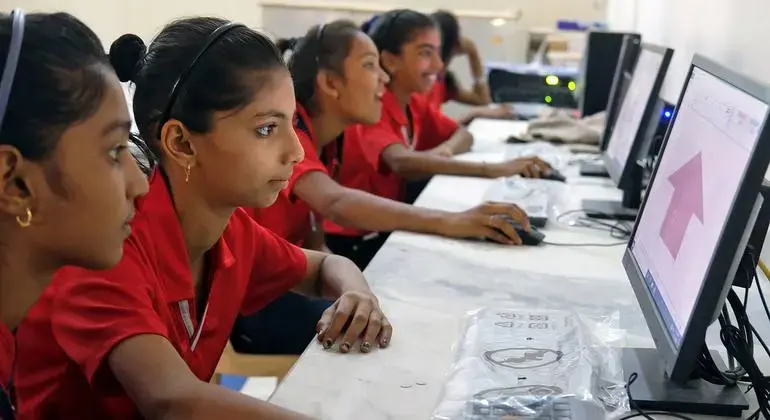
As a school student in a school where phones are banned, I think this is a bad idea. The ban achieves 2 things for me:
-
Making it harder to check a fact or figure quickly.
-
Preventing me from listening to music, playing games or browsing the web uring lunch break.
It DOES NOT stop me from becoming disengaged from the class! If I’m bored, I’ll look out the window, play with a calculator or something similar. And of course the ban hasn’t stopped many students using phones anyway. Maybe phone bans don’t solve the issue of uninteresting classes after all?

Do you guys still play block dude on the Texas Instruments calculators?

We don’t have those kind of calculators in the schools here. I just do the old-fashioned “input random sums and see what the calculator says”.

I used to play tanks and snake

Oh, Block Dude. There is a blast from the past. Modern TI calculators can run emulators. What a time to be alive.

Well, you can fact check later right? If nothing else kids will learn to be bored again, which is good.
-

Yeah good luck with that… Even if it was agreed upon it is effectively unenforceable without resorting to essentially temporary theft as we see today, causing the students to hide their phones even better.

If students hide their phones instead of being distracted by them, isn’t that mission accomplished?

As previous student who was in school when cell phones blew up in usage, I wasn’t not preoccupied by my phone because I had to keep it hidden. I was preoccupied with keeping it hidden so I could keep using it. Texting with T9 without looking was a breeze. The only thing that slowed my usage was the fact I only had like 500 texts a month allotted to me.
Making the kids hide it won’t make them less distracted. They just become distracted by hiding the phone. I feel like you’d almost have to just ban phones entirely, which today is pretty impractical.

Not really, they’re still using them. Just not as obviously. They’d be even more distracted trying to hide it and focus on everything at the same time.

Exactly

Phones like vapes in schools are there so businesses can profit by exploiting kids. The device hardware is powerful and potentially useful with the right software but the most popular apps are generally exploitative and potentially dangerous to mental health and privacy and because the industry uses dark patterns based on gambling to drive up engagement they are a distraction and reduce attention.
My kids have a lot of access to technology and the Internet at home. I am not opposed to them having phones when they show the right level of maturity and demonstrate a real need but they don’t need them in class. Their school has had a phone policy for a long time which I support. Kids should have the freedom to be themselves at school and make mistakes without them being captured and spread via mobile devices.

Phone bad!!! But jokes aside phones are not the problem, the students don’t need a phone to distract themselves from studying. Banning them won’t solve a problem it would just be tach illiterate 60 year old padding themselves on the back for „getting those evil phones out of the classroom”.

I can easily go without using my phone for extended periods of time, and always have been. I’ve never really been “phone addicted”, and never used my phone during class - despite having one for the entirety of my school years.
That still never stopped me from not paying any attention in class. Drawing on a book/desk, talking to the person next to me, looking out the window, or just spending time with my imagination were things I did too often, and I never needed a phone for any of it.
I seriously doubt banning phones would make much of a difference, other than pissing plenty of kids off. You’re essentially being forced to go to a place, every day, where you will be stripped of your personal belongings and are not allowed to be in contact with the outside world.

This was my experience with schooling as well. Sure I had my phone but it wasn’t what I needed to lose focus. The issue is how school is taught. I’ve had classes where I’m so focused and invested because of the professor and content. My mind wouldn’t even think about being bored. But some professors are honestly shit and don’t engage enough. Couple that with the general school environment and boom nobody wants to be there.

That’s my exact experience too. My school already bans phones, but that hasn’t stopped me staring out the window or just sitting there and thinking to myself. A phone would be an improvement as I’d at least have a chance of looking up something relevant to what the teacher’s saying.

I use my phone/laptop a lot in class too look things up. Like finding gifs of the stages of a beating heart, and generally, reading about the same topic being covered by the professor, but explained differently. It helps tremendously. That being said, there are certainly other people in any class that are on tiktok or whatever else and those people wouldn’t pay attention with or without their phones. Take their phones away and they’ll just distract themselves with something else. They don’t want to be there and taking their phones away won’t fix that; it will probably just make it worse.
This reminds me of the idea that violent video games causes violence; which they do, but only in people that are pre-disposed to behaving violently; and in those cases they’re violent with or without the video games. It’s the same with smart phones. They’ll only distract people that are already going to be distracted. It’s just a matter of what they’re going to be distracted by.
The onus instead should lie with how the classes are delivered, and tangentially, how the entire system itself is funded.

I’m not convinced. I think a lot more people are susceptible to getting distracted than there are susceptible to extreme acts of violence.
Your stated good use cases can easily be performed after/outside of classes. And I would say in this day and age should be part of assignments/homework/studying in high school level education to guide and educate young people in filtering, identifying and assessing source materials better. But that’s asking a lot from teachers, who are not experts at this, either.
I don’t see how any of this discussion relates to funding though.

imo with better funding teachers would have more drive and ability to create a better learning environment for their students, excluding outliers of course.
The good use cases is my personal experience, and it does not help as much outside of class when I’m reading a textbook or doing homework. It’s exponentially better for me to look this stuff up in real time when the teacher’s talking about it. It helps me visualize.
I think a lot more people are susceptible to getting distracted than there are susceptible to extreme acts of violence.
That is certainly true. I wasn’t saying anything on the contrary; merely comparing them since they are similar from psychology perspective.

Can they ban politicians from requiring tablets as an education tool? I don’t see the point. If anything, they should use a computer instead. There’s no point using a gadget sub-optimal for anything active learning.

I understand the logic that UNESCO is trying to make. However instead of a global ban on the device itself, ban the addictive parts of it. TikTok and most other corporate social media are designed to keep everyone, kids and adults alike as addicted to the platform as possible. Phones are still a valuable resource for a student, including being able to call in the event of an emergency or having access to maps or other things.
Ban the actual evil on the phones, not the phones themselves

Tiktok actually has (or had, last I looked at it) a lot of value for marginalized groups finding content made by and for each other. I used it for a while before the ads got to be too much, and I had NEVER seen so many regular trans and nonbinary and ace and aro people getting to talk to each other about whatever instead of only about gender and orientation (and seeing them existing as regular people in video form is just really fucking comforting if you’re not around others like you in real life), nor so many informative videos by and about disabled folks. T
he platform has (had?) an incredible ability to enable discovery of niche communities, and I rapidly learned a hell of a lot about accessibility (from videos by actual disabled people about their struggles and solutions and day to day lives), about modern Native American cultures (especially there were a lot of Native American amateur comedians that were very funny) and concerns (f the pipeline), about ex-mormon experiences, about autistic people (yes, there’s a lot of misinformation on tiktok about neurodivergence, but there’s ALSO a lot of actual neurodivergent people talking about what their day to day experiences are actually like in a way that’s really damn hard to find in other places that are dominated by Doctors and parent-directed articles), and people/culture from India (before India banned Tiktok), and so on and on, that I wouldn’t have learned about otherwise.
And there were more successful female and Black comedians than I’ve ever seen elsewhere. I had more videos by Black people and Asian people and women then I’ve ever even come close to having in my youtube feed; it’s not even comparable in that respect, really.
All of which long-winded paragraphs is to say, don’t ban Tiktok, or other specific platforms. Especially not when the bills that are ostensibly to do that hand absurd amounts of power to government to do the same to future platforms with little to no oversight and with little to no justification. And more platforms just like them will crop up out of the ashes anyways.
Instead, ban individually-personalized advertising, aka the root motivator that makes companies want to peel every scrap of information out of their users in the first place.
Individually targeted advertising hasn’t been a thing for that long, even though it feels so ubiquitous and unstoppable now, and for decades companies did just fine with population-level targeting like newspaper ads used to be.
I don’t think the individualized ad targeting has added anything of value to society.
Having typed all that, I re-read your comment and, yeah, I suppose schools could at least block social media sites on their school wifi. That can only do so much when they’ve all got data connections anyways, though.
Anyway I agree that phones shouldn’t be banned. It’s infeasible, inadvisable, and counterproductive.

Despite all those positives, the foundation of the platform is built in an abusive, addictive way. We shouldn’t ban any social media applications, we should regulate them to end their abbhorent practices / business models. I totally agree that we should ban targetted advertising, although there is a good middleground solution as well: banning targetted advertising which relies on cloud-based AI. If recommendation algorithms could run locally on your phone, with a way to validate everything is processed locally, you could keep the modern formula for social media while simultaneously maintaining privacy. I would imagine the suggestions would become more primitive to account for the extra processing power, but at least people can continue to doomscroll if they’d like. My idea applies better to post recommendations than advertising, but if ad recommendations could be kept anonymous (the entire system would need to be open source), you could have a privacy-respecting service AND tailored feeds / advertising.
Regulate Social Media (including domestic corporations) > Ban Social Media > The Current Situation, imo.

I appreciate your comment. I have personally avoided tiktok due to other parts of the internet (as well as coworkers and friends) portrayal of it. However you shed some light into things I would actually find value in as a person. I do see this sense of community as very good thing. My concern is more on the side of how addicted one can get to it, but I assume if it is giving them a community they never had, is it a bad thing?
I actually quite like your conclusion. Targeted ads have added nothing of value to the common person. I guess it also is part of the reason I blame the addictive nature of these apps, they want you addicted to show ads and make money.
- argv_minus_one ( @argv_minus_one@beehaw.org ) 4•11 months ago
However instead of a global ban on the device itself, ban the addictive parts of it.
There is no way to do that without giving the school remote control over the phone, which would be a security and privacy violation.

I was moreso referring to dealing with the dark patterns that apps use in general, not the school doing that.

I was with you until “TikTok and most other corporate social media”. It is all other" parts of internet that are not allowed for 13 year olds.

I would assume the average school child is more concerned about instagram or tiktok vs other parts of the internet. I would not be against finding a way to limit access to other sites, but I would prefer a privacy respecting way. Just requiring an ID is a shitty solution and screws over adults more then it helps kids (they will find grandma’s id.) If a privacy valuing solution is brought up I would be 1000% supporting it.

Wouldn’t that effectively restrict a lot of platforms to people age 16 or older? I am a bit worried that such an id law could cut off younger queer teens dealing with abuse that’s severe enough to qualify as abuse in the academic sense, but not in the eyes of the law, from vital community… ~Strawberry

Yes the effects would be terrible for everyone, that’s why I am against it.

I think trchnical solution is not s problem, if we decide what needs to be applied we can do it.
If kid finds grandmother’s id - it is simple enough, punish grandma for providing her id, it will teach adult to be responsible. Additionally, not all kids will be able to do it. I doubt they will follow us.
My opinion, eve if it is obvious, parents are responsible Punish them for not protecting their kids.

they give 0 thoughts to what they say or are they just idiots?
Just a question: Are the tech managers in Silicon Valley also idiots? I posted the article already, but here’s it again as the thread has become long: https://www.theguardian.com/teacher-network/2015/dec/02/schools-that-ban-tablets-traditional-education-silicon-valley-london

“Those students who use tablets and computers very often tend to do worse than those who use them moderately,” he adds.
This is from your article and I could have saved them the money of doing this research. Also this is tablets not phones. They are allowed phones. You know why? because even they understand not everyone can see their house from the classroom window and need to use the phone to communicate.
Limiting the use during class is all I am in for. Banning it from school is just idiotic.
Also yes. I do think tech managers in Silicon valley are idiots. The biggest proof of that is we are talki g on lemmy and not reddit.

Would be good for breaking some phone addictions, but good luck to the teachers that will have to deal with the withdrawls of the students.

I hate these kind of discussions. UNESCO released a report of over 400 pages full of research, recommendations, possible outcomes, etc. but here we are discussing just what people think when they hear “ban smartphones”
Tablets out, imagination in: the schools that shun technology (2015)
In the heart of Silicon Valley is a nine-classroom school where employees of tech giants Google, Apple and Yahoo send their children. But despite its location in America’s digital centre, there is not an iPad, smartphone or screen in sight.
- money_loo ( @money_loo@1337lemmy.com ) 3•11 months ago
Feel like you should post this stuff in the Luddite community, not the technology community.

My kids who are now teens had ipod touches practically from birth (we got the first versions of the Ipad, raspberry pi etc). They looked so clever to non-technical people fluidly swiping puzzle pieces around on a screen in a UI language most adults at the time barely understood. Then one day I put a wooden puzzle in front of them and realised their touch puzzle apps lacked several degree of freedom available in the physical world and they didn’t know how to rotate. The physical world is so much richer in many ways and skills learned in it are often more widely applicable.
It isn’t that technology isn’t valuable and can provide a benefit. It isn’t automatically superior or more complete and some people fetishize it to a ridiculous extent. For decades kids spent a huge amount of time cutting and pasting content into powerpoint in primary schools here at the expense of illustrating, reading and hand writing because companies like Microsoft were engaged in a war for mind share. Most technical people like myself thought this was a very poor use of technology but less technical people probably thought we were luddites. I have seen my kids do animation and story telling with apps that I think is quite a good use of technology but I wouldn’t deny them the experience of doing art with physical materials which I think in most ways is more foundational.
- argv_minus_one ( @argv_minus_one@beehaw.org ) 2•11 months ago
I have seen my kids do animation and story telling with apps that I think is quite a good use of technology but I wouldn’t deny them the experience of doing art with physical materials which I think in most ways is more foundational.
This reminds me of a time when I was a kid, drawing something in class, when I started drawing little colored dots, mimicking pixels on a screen. I thought computer graphics was so cool. I still do, but I did then, too!
I was fortunate that, for their first home computer, my parents sprang for a fancy 486 machine with a graphics card capable of 24-bit color. Thanks to that hardware and various pieces of graphics-related software, I got a solid understanding of pixel graphics and the RGB color system. I also learned fundamentals of graphics programming thanks to QBasic’s built-in support for VGA graphics modes—I’d imagine a shape, then figure out how to teach the computer to draw it using QBasic’s graphics primitives.
I also had traditional art supplies as a kid, but they went mostly unused. I gravitated hard toward computer graphics. I think it’s because I was fond of pretty lights as a kid, and what’s a computer screen but an array of several million pretty lights?

If only it were doable.
It is doable, but the parents must contribute to that.
- money_loo ( @money_loo@1337lemmy.com ) 4•11 months ago
So literally every one of these technology communities exists just to spread FUD and hate on technology? I can’t find a single one that actually likes tech…ugh.

